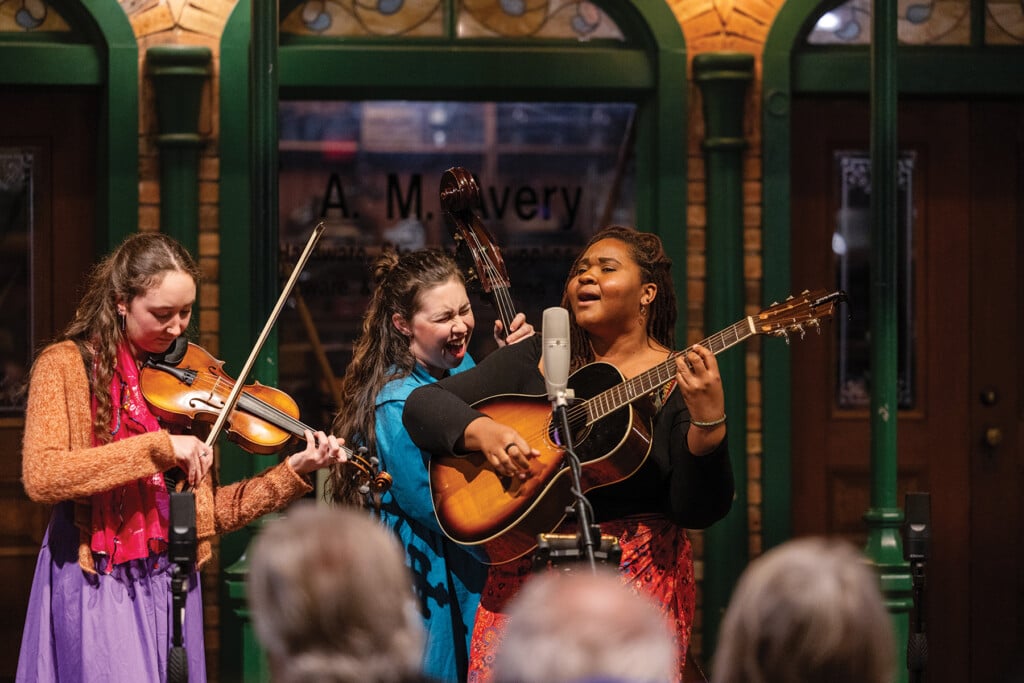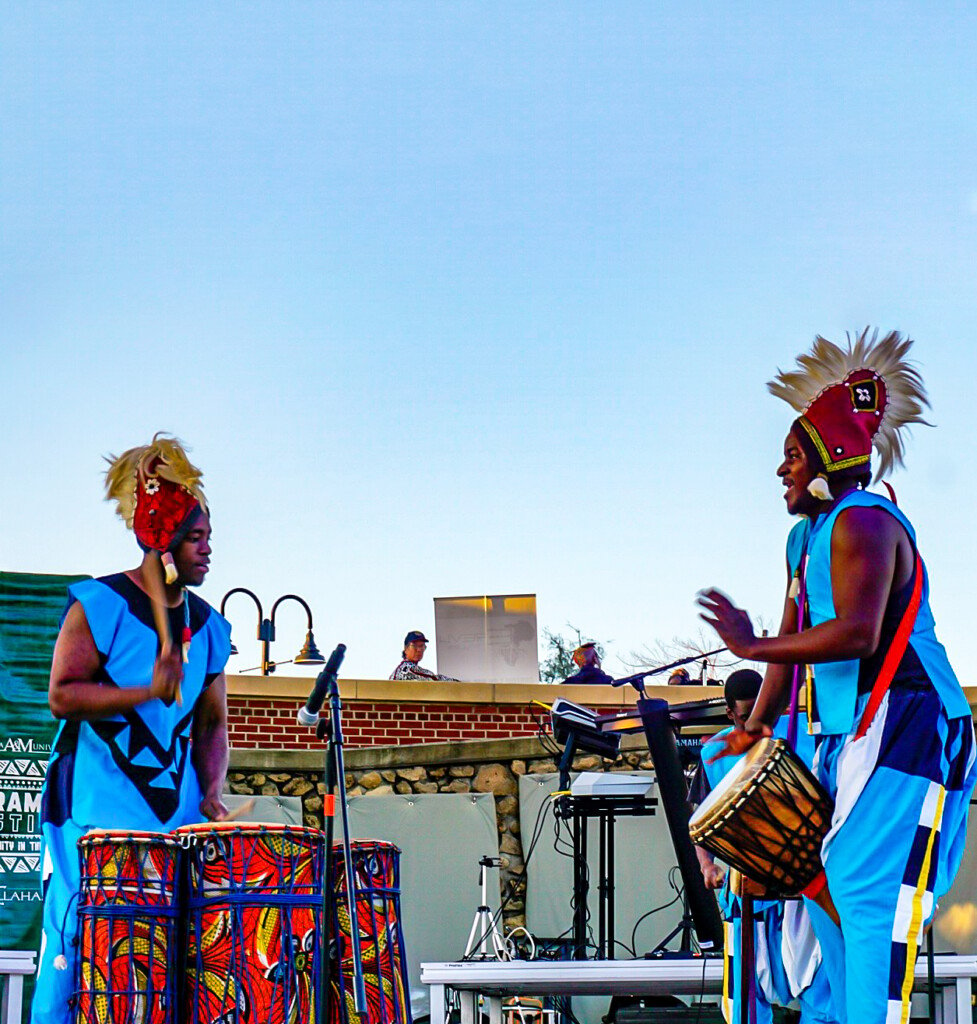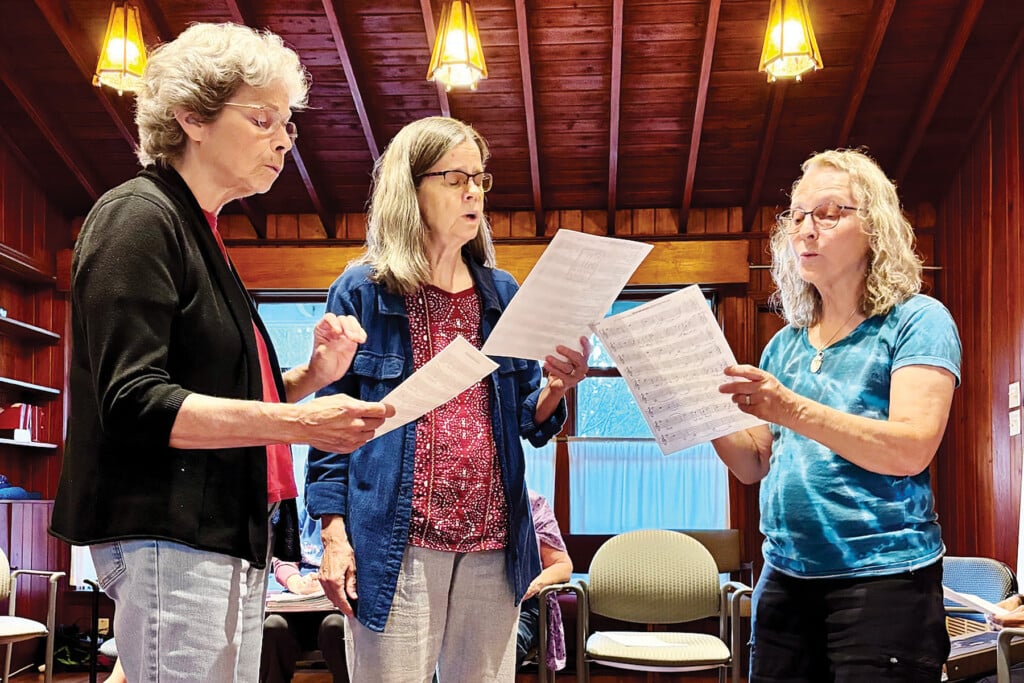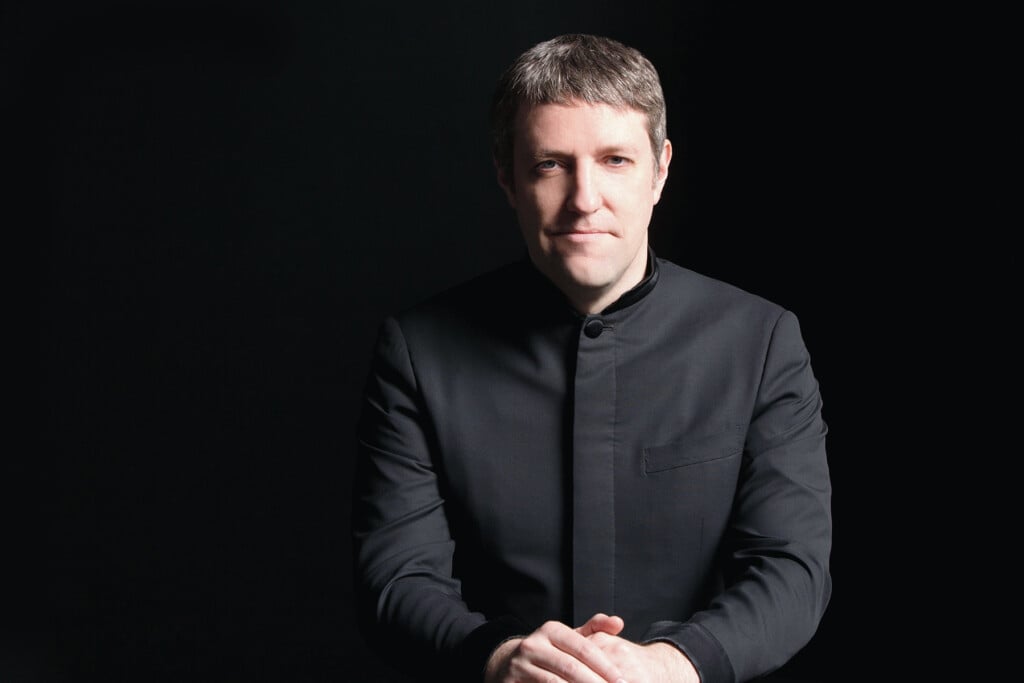The Little Mercies
Tallahassee’s sweethearts of old-time folk

On a sweltering summer day at the Florida Folk Festival, a crowd of music lovers packed the performance tent to hear the toe-tapping tunes of fiddle, banjo, and harmonies wafting in the humid air. They were gathered to hear The Little Mercies, a trio of women who have carved out a niche in the modern folk scene with vintage soul, heartfelt lyrics, and a sound that’s based in tradition yet alive with fresh energy.
The Little Mercies are Bronwyn Chelette, Rosalee Walsh, and Shanice Richards—three musicians whose lives were brought together by music, chance, and a mutual love for the kind of narrative that only folk music can do right.
Bronwyn Chelette, a Gadsden County native, plays banjo and bass and adds her vocals and songwriting skills to the band’s extensive repertoire. Chelette’s songs have a profound awareness of Southern musical heritage and bear the weight of generations as well as the lilt of rural rhythm.
She initially met violinist and singer Shanice Richards at Blue Tavern, a quaint and popular Tallahassee establishment located just off Monroe Street. Richards, a South Floridian with a background in jazz, reggae, hip hop, and gospel, began her musical journey at Florida State University when she joined the FSU Old-Time Ensemble, which Dr. Aisha Ivey guides.
The two also connected with Rosalee Walsh, who became a well-known figure in Tallahassee’s folk and roots culture when the pandemic disrupted the routines of daily life. She had come from Colorado with a strong ear for arrangement and a suitcase full of instruments, including fiddle, mandolin, and banjo, which she plays with a wild elegance. Walsh manages the band’s social media and designs their signature merchandise.
Dr. Ivey, a professor at Florida State University College of Music, emphasized authenticity and emotional connection over polish, and her influence can be felt in Tallahassee’s acoustic culture today. Richards incorporates that philosophy into every bow stroke and lyric, thereby redefining who old-time music is for and who it may reach.
“She led me to play music without it having to be perfect. … That led me to this larger community of people who also felt the same way and wanted to play music just for the fun of it,” Richards says.
Though often overlooked in broader music conversations, Tallahassee has been a quietly powerful hub for roots musicians. With its mix of Appalachian, African American, and Gulf Coast influences, the city sits at a cultural crossroads, where tradition and experimentation dance together.
The city’s folk scene is bolstered by institutions like the Florida Folklife Program and legendary listening rooms like the Monticello Opera House and Blue Tavern, where seasoned pickers and emerging songwriters often share the same stage. Festivals such as the Florida Folk Festival and Word of South have also created space for folk to flourish across generations.
The Little Mercies embody that spirit. Their music is intimate, sometimes humorous, and always grounded in reality; it sounds like front-porch confessionals and firefly-lit jam sessions.
The three women combine their musical talents to create a signature sound that is both familiar and unique. The result is a hybrid of old-time folk, bluegrass, and gospel, laced with the emotional depth of R&B and jazz.
Mark Mustian, founder of Word of South, invited the group to play for a sponsors’ party and later said, “People kept asking me, ‘Who are these guys, and why have I not heard them before?’”
The band’s musical repertoire runs from old-time traditional favorites such as “Sarah Armstrong” to ballads such as Gillian Welch’s “Caleb Meyer” to original songs, including “The Harvest” by Chelette and “Lately” by Richards.
And sometimes their music combines something from each of them. For example, together they created the song “Mending,” combining Chelette’s folk storytelling with Walsh’s bluegrass sensibilities and Richards’ soul-infused melodies, resulting in a complex, emotionally charged work that shows each woman’s abilities while being cohesive in tone and message.
While The Little Mercies have a consistent sound, they are also fiercely individual artists, each with her own identity as a songwriter and performer. This individual artistry is important to them, and it helps the band grow both as a collective and as individual performers.
“One of my goals was to make a tune that the band was really excited to play,” Chelette says.
The Little Mercies has been invited to play at festivals across Florida and as far away as Colorado and Maine. Their upcoming performances at the Southeast Regional Folk Alliance Conference in Kentucky and other regional shows allow them to share their unique sound with a broader audience while also growing as artists in their own right.
The band’s rise to independence is profoundly based on community ideals. Early in their career, The Little Mercies made a strategic decision to stay self-managed and self-produced, giving them ultimate creative control over their sound and message. Rather than signing with a major label, they use grassroots techniques to establish a dedicated fan base, including crowdfunding campaigns, community partnerships, house concerts, and regional folk festivals. By leaning into the intimacy of their performances, they create a sense of community among fans, including them in the storytelling process.
According to Carrie Hamby, proprietor of Blue Tavern, “The Little Mercies are one of Tallahassee’s favorite musical acts.
“All three are extremely adept and versatile instrumental and vocal musicians,”she says. “One of my favorite things is how their friendship shines through their close harmonies and sense of fun on stage.”
While the band is rooted in tradition, technology plays an important part in their independent development. Using sites like Bandcamp, Patreon, and social media, they have established direct lines of communication with their audience, providing unique content, behind-the-scenes peeks at the recording process, and personal insights into their songwriting journey. This transparency serves to convert casual listeners into passionate fans.
In addition to performing shows, the musicians incorporate community engagement into the framework of their music. They engage in interactive performances in community centers, schools, assisted living, and other facilities.
For the second year in a row, they are leading music sessions at Sandy’s MusicGirls Camp in Lake Wales, Florida. The camp helps girls develop their creativity and build self-esteem through immersion in the musical arts.
“The camp is free for girls in the area, and it gives us a chance to reach out to an underserved audience. It’s a solid week of playing music, allowing them to express themselves and just have fun,” Chelette said.
The band members have also been involved with Sinfonia Gulf Coast, visiting schools to perform, inspire, and educate students about music.
In a world where mainstream success often requires compromise, The Little Mercies demonstrates that independent talent can be both daring and thoroughly grounded. Their growth is not only energizing the Florida folk scene; it is also changing what it means to be in the folk genre in the twenty-first century.



